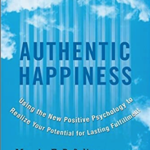 When I was in college 20 years ago here in Missoula, Montana, my philosophy professor assigned the book, Authentic Happiness (Simon & Schuster, 2002) by Martin Seligman. This seems like a great time to review some of its wisdom and see what has rung true for me over the last two decades.
When I was in college 20 years ago here in Missoula, Montana, my philosophy professor assigned the book, Authentic Happiness (Simon & Schuster, 2002) by Martin Seligman. This seems like a great time to review some of its wisdom and see what has rung true for me over the last two decades.
One of the most memorable take-aways for me came in its lessons about money. The simple message was that more money can make you happy, but only to a point. If you could find out exactly what that point was for you, you’d be excited, right? Let’s have a look at some of the details.
We’ve evolved to live on a hedonic treadmill

The “hedonic treadmill” is a phrase coined by Philip Brickman and Donald T. Campbell in their essay “Hedonic Relativism and Planning the Good Society” (1971). It describes both individual human nature and human societies. Hedonic refers to pleasure-seeking. This can be anything from seeking out delicious food to sex to bigger houses or adrenaline-pumping activities like sky-diving. Humans are hardwired to never quite be satisfied. Once we reach a goal and pause, another one quickly comes to mind and we are off and running once again.
Part of the findings of Brickman and Campbell was the idea that we all have an initial “set point” in our happiness. This is our general level of happiness that likely won’t change in our lives. They later tested the hypothesis by studying both lottery winners and accident victims. They found that after an initial burst of joy, lottery winners often fall back to whatever level of happiness they had before winning. The same happened to accident victims. Even people who were badly injured, such as paraplegics, eventually resumed pre-accident levels of happiness on average.
Key takeaways from the Hedonic Treadmill
I recall one major lesson from the section on money and the hedonic treadmill. It was probably because it was so counterintuitive. Namely, you will be happier living in a neighborhood where you earn slightly more than your neighbors. Sounds odd, right?
The reason for this is that you do not feel the need to “keep up with the Joneses” as much. If you stretch your budget and live in a nicer neighborhood where people make more, you’ll notice them taking nicer vacations, driving nicer cars, and throwing lavish parties that you can’t afford (because you’ve stretched your budget already). But if you live in a neighborhood where you can easily afford the house, you might also be able to afford better cars, vacations, and more when you want them. More importantly, you’ll see people around you living more humble lives, lowering the external pressure on you to consume ever more.
Purchasing Power
The conclusion from this is that happiness is not merely a matter of purchasing power. A global study that looked at national rates of “life satisfaction” and “purchasing power” in the book put Switzerland at the very top in terms of life satisfaction. They had an 8.36 score out of ten. They also had great purchasing power, with a 96 out of 100. USA had a life satisfaction in sixth place with 7.73 and purchasing power at 100.
Worth noting were some of the anomalies. Ireland, for instance, only had a purchasing power of 52 yet scored above USA with a life satisfaction at 7.88. Another striking figure comes in comparing Japan and Nigeria. They both scored in the middle of the survey, with life satisfaction at 6.53 (Japan) and 6.59 (Nigeria). But the wealth of the countries was vastly different. Japan’s purchasing power was 87. Nigeria’s was just 6. India, with an even lower relative purchasing power of 5, scored even higher in life satisfaction at 6.70.
Earning enough
Within the United States, surveys found that making more money did correlate with more happiness. But only to a certain extent. Broadly speaking, a person or household making around 200% of the poverty level has peaked. This might vary based on local living expenses or other factors (like spikes in housing or other costs), but in general this is a number to seek out.
For a single person this is around $25,000. For a family of 5 it is $62,000. For people at these levels, more money generally doesn’t mean more happiness. In fact, the extra effort needed to earn more can lead to less happiness: more stress, more time away from family and friends, etc.
Living with simplicity

As I said, these numbers might vary for you. But it’s good to know the trends. And it’s good to know that we are hard-wired and often socially pushed to want more, more, more.
Changing our mindset to a simplicity ideal is not easy. However, it’s not impossible. We know that people can be happy with less in some places like India and Nigeria for some particular reasons. They cherish family highly in those countries. They follow traditions. These are sometimes restrictive and need to change. But often they are powerful forces that bring people together to share joy.
The chapter on money from the book ends with this exhortation:
How important money is to you, more than money itself, influences your happiness. Materialism seems to be counterproductive: at all levels of real income, people who value money more than other goals are less satisfied with their income and with their lives as a whole, although precisely why is a mystery.
So as much as we might find ourselves worrying about money and longing for more, remember that there are likely to be more important factors for your own happiness.
 Justin Whitaker, Ph.D., holds a doctorate in Buddhist ethics from the University of London. He has given lectures, and taught Buddhist studies and Philosophy at Oxford University, the University of Hong Kong, the University of Montana, and at Antioch University’s intensive study-abroad program in India. A certified meditation teacher, he is a regular contributor to Patheos.com, and Senior Correspondent for Buddhistdoor Global. He lives in Missoula with his family.
Justin Whitaker, Ph.D., holds a doctorate in Buddhist ethics from the University of London. He has given lectures, and taught Buddhist studies and Philosophy at Oxford University, the University of Hong Kong, the University of Montana, and at Antioch University’s intensive study-abroad program in India. A certified meditation teacher, he is a regular contributor to Patheos.com, and Senior Correspondent for Buddhistdoor Global. He lives in Missoula with his family.
